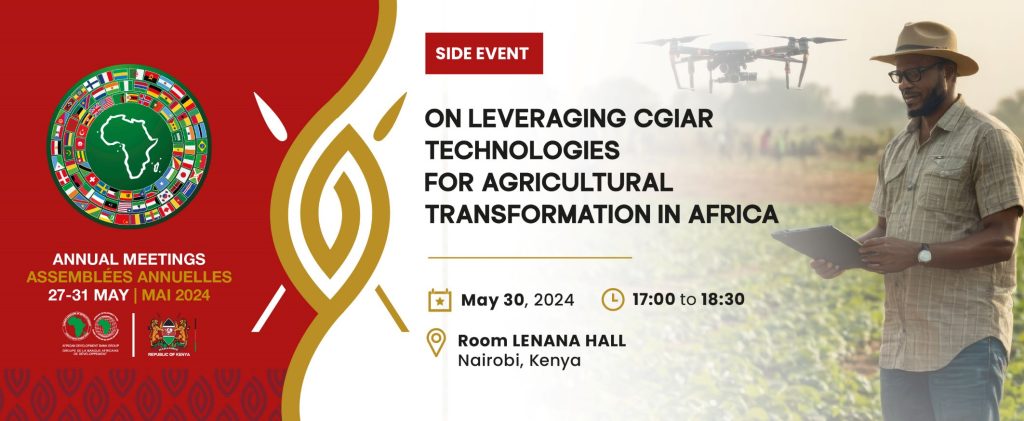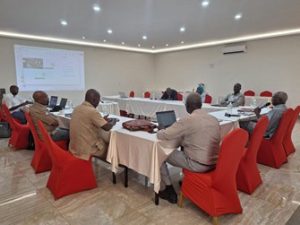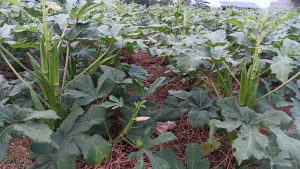Leveraging Innovative Technologies for African Agricultural Transformation

The African Development Bank Group, in collaboration with the CGIAR and Technologies for African Agricultural Transformation (TAAT), is hosting a side event on how the bank is leveraging innovative technologies to transform agriculture in Africa.
The event will be held on Thursday, 30th May 2024, on the sidelines of the 2024 Bank Annual Meetings. Dr Akinwunmi Adesina, President of the African Development Bank, Hon. Njuguna S. Ndung’u, Minister of Finance, Kenya, Hon. Dr. Mwigulu L. Nchemba, Minister of Finance, Tanzania, Dr. Lindiwe Sibanda, Chair of the CGIAR System Board, and Dr Simeon Ehui, Director General of IITA and Regional Director for CGIAR Africa are expected to speak at the event.
The event will present a high-level opportunity for stakeholders to share their experiences, including any ambitious solutions to the most pressing global challenges, such as climate change, food insecurity, and rural poverty.
This event aims to facilitate dialogue and collaboration between the African Development Bank and the CGIAR, focusing on successfully adopting and adapting CGIAR technologies to drive agricultural transformation across the continent. The event will feature two-panel discussions for African Ministers of Finance and development partners/private sector sessions on topical issues that advance Africa’s agricultural transformation.
The event will equally underscore the urgency of accelerating the adoption of CGIAR technologies collectively with its partners to successfully implement the Dakar 2 Framework, including new investments in research and delivery (R&D), training, seed systems, extension, and evidence-based policy.
Other areas of interest to be covered include potential areas of collaboration between AfDB and CGIAR in advancing agricultural research, technology adoption, and innovation across Africa, strategies for scaling up successful agricultural interventions and innovations to reach more smallholder farmers and communities, collaborative efforts to strengthen climate resilience and adaptation strategies, imperative of engaging youth and women in agricultural transformation efforts, and identification of opportunities for joint initiatives that promote inclusive and gender-responsive agricultural development.
Capacity building for country-based national agricultural research services partners, young scientists and extension workers, and private-sector seed growers to produce certified seeds and new investments in research and innovation, training, and extension to drive agricultural development and resilience will also be on the front burner of the event.
Agriculture remains a cornerstone of Africa’s economy, providing livelihoods for most of the population and serving as a critical economic growth and food security sector.
The African Development Bank has long been committed to supporting agricultural transformation globally, recognizing its pivotal role in driving sustainable development.

The CGIAR, a global research partnership for a food-secure future, has been at the forefront of agricultural research and innovation, working to address some of the most pressing challenges facing agriculture in Africa.
Technologies for African Agricultural Transformation (TAAT) is a programme funded by the African Development Bank to increase agricultural productivity in Africa by deploying proven, high-performance agricultural technologies. It is currently being implemented in over 45 African countries as a central pillar of the Bank’s Feed Africa strategy and fundamental to African agricultural transformation.
TAAT brings together a consortium of partners under its Regional Technology Delivery Infrastructure (RTDI) led by the CGIAR to deploy over 100 selected, proven, and high-performance agricultural technologies to millions of farmers, focusing on eliminating extreme poverty, ending hunger and malnutrition, turning Africa into a net food exporter, and positioning Africa at the top of agricultural value chains.
Some TAAT success stories so far
Wheat
In Ethiopia, following the nationwide deployment of heat-tolerant wheat varieties by TAAT, CGIAR, and the National Agricultural System partners, the irrigated-wheat cultivated area rapidly expanded from less than 5,000 ha in 2018/19 to 187,240 ha in 2020/21 to 650,000 ha in 2021/22. Yields of wheat increased on average from 2.0 t/ha to 4 t/ha. Ethiopia’s wheat production increased by an additional 1.6 million metric tonnes in 2022 and the country achieved self-sufficiency in wheat production. Ethiopia is poised to export wheat for the first time in the coming wheat season.
In Sudan, the TAAT achieved transformative impacts in terms of raising productivity, production, and farmers’ income and attaining greater self-sufficiency through massive deployment of climate-resilient proven wheat technologies. The provision of seeds of heat-tolerant wheat varieties led to the establishment of 317,000Ha of low-land irrigated wheat, and Sudan’s national wheat production increased by 136%, up from 472,000 MT in 2014/15 to 1.15 million MT in 2019/20; Consequently, Sudan increased its wheat self-sufficiency from less than 20% in 2014/15 to 50% in 2020/21. The national average wheat yield increased by almost 67%, up from 2.1 t/ha in 2014/15 to 3.5 t/ha in 2019/20.
TAAT catalysed the production and distribution of 150,000 MT of certified seeds of heat-tolerant wheat varieties cultivated on 2,521,211 ha in the intervention countries. A total of 1,434,545 farmers have reached certified seed, resulting in an average yield of 3.4 MT/ha. An estimated 7,670,842 MT was produced in the Wheat Compact intervention countries.
Maize
TAAT convened platforms of seed companies, farmer groups and government research and extension agencies to catalyse the dissemination of climate-smart maize technologies such as the elite Water Efficient Maize for Africa (WEMA) varieties.
TAAT facilitated the production and dissemination of 21,983 tons of climate-smart maize by seed companies for nearly 879,320 ha of cultivated area. Through its extensive partnership network, TAAT reached 2,302,585 farmers with climate-smart maize varieties who obtained average maize yields of 2.68 t/ha. TAAT has catalysed the production of 2,331,111 MT of maize grain.
Rice
TAAT has disseminated 67,739 MT of seeds of climate-adapted and high-yielding rice varieties, which were planted on 1,354,780 ha and benefited 2,252,987 farmers. This boosted rice production by 5,039,579 MT of paddy and 3,326,122 MT of milled rice.
High-Iron Beans
TAAT focused on the distribution and use of improved High Iron Bean varieties (32 biofortified varieties) that are high in zinc to improve immune functions and iron to reduce anaemia in women and children, therefore improving cognitive and physical development in children under 5. A collaboration between TAAT and the Pan-African Bean Research Alliance (PABRA) has facilitated the cultivation of 169,229 ha with HIB. Over 898,308 farmers were reached with 48,461 MT of certified seeds of various HIB varieties. Average bean yields have increased to 1.2 MT/ha, and 213,808 MT of High Iron Beans have been produced.
Sorghum and millet
Through a partnership network comprising TAAT, ICRISAT, National Agricultural Systems and the private sector, over 540.6 MT of certified millet seeds and 851 MT of certified sorghum seeds were produced for distribution to 83,199 farmers. The average yield for sorghum was 3 MT/ha, while that for sorghum was 4 MT/ha. TAAT organized farmer field schools to demonstrate the performance of sorghum and millet varieties and to build the capacity of Sahelian farmers on soil and water conservation techniques, including zaï pits, half-moon, and contour line techniques.
Orange-fleshed sweet potato
TAAT, in collaboration with the International Potato Center (CIP), delivered approximately 131,888,400 vine cuttings to 439,628 farmers through partnerships in eight countries located in Central, East, Southern, and West Africa. TAAT conducted nutrition education and awareness-creation campaigns and trained over 18,659 individuals on improved skills in agriculture enterprise development. Over 600 new entrepreneurs were engaged in small and medium agribusiness.
Recent Stories
Related Stories
- Leaders acknowledge TAAT as a bold initiative to achieve a hunger-free world
- TAAT and the imperatives of food systems transformation in Benin
- Global Partnerships and Investments, crucial to leveraging technologies for Food Systems Transformation – AfDB, CGIAR and Stakeholders
- Tanzania: TAAT and partners Showcase Scalable Solutions for Africa’s Grain Challenges
- Agribusiness Forum Djibouti: TAAT at the heart of agricultural transformation in Djibouti




